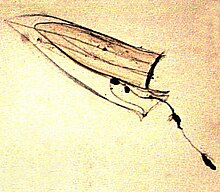Muggiaea is a genus of siphonophores in the family Diphyidae. Members of this family are colonial siphonophores with two nectophores (swimming bells) arranged one behind the other, but in the genus Muggiaea, the posterior nectophore is absent. The anterior one has a complete dorsal ridge. The somatocyst (extension of the gastrovascular system) is very close to the nectosac (central cavity with muscular walls) wall.[2][3]
| Muggiaea | |
|---|---|

| |
| Muggiaea atlantica | |
| Scientific classification | |
| Domain: | Eukaryota |
| Kingdom: | Animalia |
| Phylum: | Cnidaria |
| Class: | Hydrozoa |
| Order: | Siphonophorae |
| Family: | Diphyidae |
| Genus: | Muggiaea Busch, 1851[1] |
| Species | |
|
See text
| |
Species
editThe World Register of Marine Species includes the following species in the genus:[1]
- Muggiaea atlantica Cunningham, 1892
- Muggiaea bargmannae Totton, 1954
- Muggiaea delsmani Totton, 1954
- Muggiaea kochii (Will, 1844)
References
edit- ^ a b Schuchert, Peter (2015). "Muggiaea Busch, 1851". WoRMS. World Register of Marine Species. Retrieved 2015-04-15.
- ^ C. D. Todd; M. S. Laverack; Geoff Boxshall (1996). Coastal Marine Zooplankton: A Practical Manual for Students. Cambridge University Press. p. 19. ISBN 978-0-521-55533-3.
- ^ P. A. Kirkpatrick; P. R. Pugh (1984). Siphonophores and Velellids: Keys and Notes for the Identification of the Species. Brill Archive. p. 104. ISBN 978-90-04-07470-5.